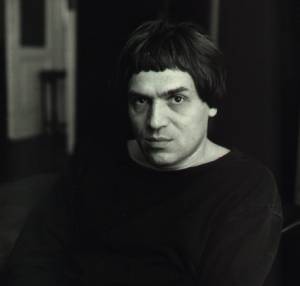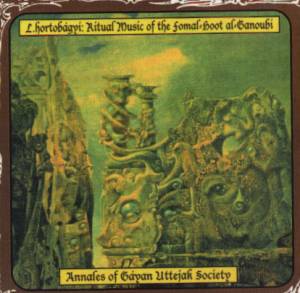THE ELECTRONIC MUSIC
IN EASTER EUROPE
Chapter 4
By: Jorge Munnshe
It is impossible to attempt to compress the musical universe
enclosed behind the iron curtain by decades in a single mini-series. A basic approach to
the reality of the musical avantgardein each one of the multiple, rich cultures of this
great unknown which is Eastern Europe, nowadays in full development, would need the making
of a book. Therefore, this mini-series will only be a brief vision, perforce incomplete,
of these innovative styles sustained on cultures maybe as ancient or even more so than
those in the rest of Europe.
 HUNGARY
HUNGARY
This is a very different country from other nations in Eastern Europe from a cultural
point of view. Fantastic literature has enormous editorial success. The native cinema of
science fiction and terror presents a high amount of titles. There are plenty of
electronic soundtracks of a cosmic orientation, as for instance that of the television
series "The Millenium Bee", composed by Peter Hapka, one of the many Hungarian
synthesists currently functioning.
Of course, György Ligeti is the first name that comes to our minds
with respect to Hungarian avantgarde music. Yet, other less known ones are very
interesting as well, as for instance the electronic pioneers Laszlo Hortobaggi, Miklos
Maros, Akos Rozmann, and Tamas Ungvary, who have been making their music since the early
1970s. I was able to contact this latter one in Sweden, where he has settled since a few
years ago. Actually, the Scandinavian countries were the ones receiving more immigrants
from Eastern Europe. No wonder, one of the main supporters of the Festival of the Arts in
Iceland is the Russian pianist Vladimir Ashkenazy. Some of these exiled musicians are
coming back to their countries of origin, whereas others have already grown new roots in
the nations that accepted them.
Tamas Ungvary settled in Sweden in the late 1960s, leaving his post
as a musician for the Hungarian State Symphonic Orchestra. In Sweden he combined the
composition of avantgarde music with his work at the Institute of Electroacoustic Music of
Sweden, as well as his activity designing musical software. He has obtained several
mentions and awards, has composed movie soundtracks, and has published numerous articles
about his research on new forms of musical expression.
 Akos Rozmann is an organist, and this can be seen in the music he composes,
very much centered in floating, ethereal, mystic textures. He left Hungary in 1971, and
settled in Sweden, where he has combined his work as a composer with his activity as an
organist of the Catholic Cathedral of Stockholm, like the ancient classical composers.
Akos Rozmann is an organist, and this can be seen in the music he composes,
very much centered in floating, ethereal, mystic textures. He left Hungary in 1971, and
settled in Sweden, where he has combined his work as a composer with his activity as an
organist of the Catholic Cathedral of Stockholm, like the ancient classical composers.
Miklos Maros is another electroacoustic musician settled in Sweden,
who has combined his artistic activity with his task as a professor at the Institute of
Electroacoustic Music in Sweden.
The ensemble "Group 180" is devoted to performing, even at
an international level, compositions by Steve Reich, among pieces by contemporary
Hungarian authors.
Tibor Szemzo eis a veteran synthesist, whose compositions have
reached a wide range, from Jazz to the purest cosmic music.
Istvan Marta makes minimalist music, that reminds the listener of
Philip Glass, with folkloric Hungarian and Transylvanian touches.
 Amadinda are a percussive ensemble, with several released albums.
Amadinda are a percussive ensemble, with several released albums.
Istvan Szigeti is some sort of Hungarian version of Klaus Schulze.
Omega was a symphonic Rock band that functioned from 1969 to 1980.
As it dissolved, some of its members have continued with their solo works. Ex-keyboardist
Laszlo Benko has released several albums of electronic music.
Koral is an Omega-style band, yet it appeared later, whose
keyboardist, Ferenc Balazs, has also released a solo album of electronic music.
 Also remarkable is the task carried out by Robert Erdesz, Matyas Varkonyi,
Tibor Kocsak, Gabor Presser, Robert Mandel and Steve Osso.
Also remarkable is the task carried out by Robert Erdesz, Matyas Varkonyi,
Tibor Kocsak, Gabor Presser, Robert Mandel and Steve Osso.
Nowadays an unprecedented amount of new electronic musicians are
cropping up in Hungary, among which mention should be made of Zoltan Pongrasz, Peter
Eotvos, Laszlo Dubrovay, or Mate Victor.
I understood very well what a politically prosecuted, stateless
artist is when I contacted the guitarist, composer and painter Peter Katona in Germany.
His trajectory no doubt is the same followed by many artists. He told me he had left
Hungary because of strictly political reasons. Very influenced by the concept of World
Music, Katona played in Rock, Jazz, and all sorts of bands during the 1970s. During the
period 1979-82, he discovered the ethnic musics from Bulgaria, Afghanistan, and India,
which fascinated him and impressed him deeply. From 1982 on, he combined the teaching of
music at the Music School of Budapest, with his activity in different bands. In 1985 he
purchased his first musical computers. The following year he had to flee from Hungary, and
settled in Germany. He told me that due to different legal circumstances, German
legislation forbade him to teach for the first five years he was living there, so he had
to find a job as a musician. He was not allowed to carry out other activities. In 1991 I
lost contact with him all of a sudden. My letters were returned with the indication that
he does not live there now. I ignore whether he came back to Hungary or if he continues to
live in Germany. I will be grateful for any recent information on this musician forwarded
to me. Emailme at 
 Previous Page (Articles/News)
Previous Page (Articles/News)
 HUNGARY
HUNGARY Akos Rozmann is an organist, and this can be seen in the music he composes,
very much centered in floating, ethereal, mystic textures. He left Hungary in 1971, and
settled in Sweden, where he has combined his work as a composer with his activity as an
organist of the Catholic Cathedral of Stockholm, like the ancient classical composers.
Akos Rozmann is an organist, and this can be seen in the music he composes,
very much centered in floating, ethereal, mystic textures. He left Hungary in 1971, and
settled in Sweden, where he has combined his work as a composer with his activity as an
organist of the Catholic Cathedral of Stockholm, like the ancient classical composers. Amadinda are a percussive ensemble, with several released albums.
Amadinda are a percussive ensemble, with several released albums. Also remarkable is the task carried out by Robert Erdesz, Matyas Varkonyi,
Tibor Kocsak, Gabor Presser, Robert Mandel and Steve Osso.
Also remarkable is the task carried out by Robert Erdesz, Matyas Varkonyi,
Tibor Kocsak, Gabor Presser, Robert Mandel and Steve Osso.